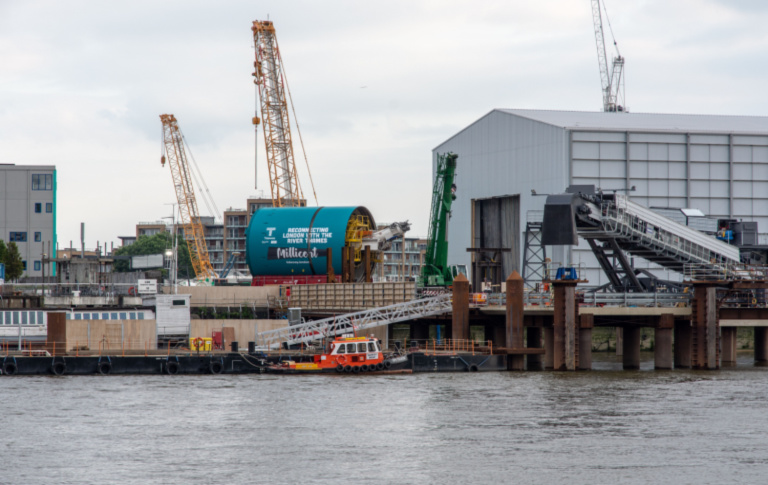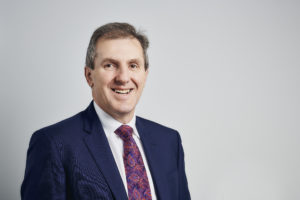Tideway CFO on embedding sustainability into its ‘Super Sewer’ infrastructure project
Mathew Duncan, CFO at Tideway, outlines how its ‘Super Sewer’ project serves as a blueprint for infrastructure projects across the UK
Mathew Duncan, CFO at Tideway, outlines how its ‘Super Sewer’ project serves as a blueprint for infrastructure projects across the UK

Tideway, the organisation responsible for building a 25km ‘Super Sewer’ under the River Thames, is pursuing a strong ESG agenda to minimise environmental impacts and support local people.
“Tideway at its heart is an ESG project with a purpose to clean up the Thames River but it also represents a significant infrastructure project during which we are looking to see how we can benefit the local community,” says Mathew Duncan, CFO at Tideway.
“We have set ourselves various ESG targets in relation to how the project is financed and executed. We are also trying to be as sustainable as we can in the construction of what is a major civil works.”
He explains that the company works according to five core values: responsibility and sustainability; legacy; collaboration; respect and innovation.
“What we have done is link these core values to the United Nations’ Sustainable Development Goals (SDRs). We have selected ten of the most relevant SDGs, which we report against to show how what we are doing fits in with their sustainability measures.
“We also rely on an independent assessment by Standard & Poor’s on how we are performing in terms of meeting our sustainability goals. We are scored against other organisations – and have done very well against them. This remains one of the most demonstrable ways of proving our sustainability – we don’t mark our own homework.”

Duncan points out that a key element of Tideway’s ESG agenda is its commitment to arranging green financing.
Tideway published a framework for the issuance of green bonds in November 2017. This was updated in 2020 to a sustainable finance framework under which Tideway and its financing arm Bazalgette Finance Plc (BFP) raise debt to finance the sewer project.
BFP issued its debut green bond in 2017 and has now issued a total of 18 green bonds, all of which are covered by a green transaction evaluation from S&P Global Rating.
“Because we are a sustainable project, it makes sense for us to commit ourselves to raise finance using green bonds, and we were the largest issuer of green bonds about three years ago in the UK. We have been driving major innovation in the financing of this project,” says Duncan.
Tideway also has a revolving credit facility, which is structured as a sustainability-linked loan, to align its financing with the long-term target of the project and its legacy ESG commitments.
Duncan points out that as the CFO, his main role involves raising finance and reporting on how Tideway is progressing.
“I do have a wider remit in making sure that we are doing well in terms of the sustainability goals that we have set ourselves,” he says.
“Another key part of my role is to deal with our investor base who want to make sure that we are doing the right thing, and this involves providing information on our ESG performance and how responsible we are. I am answerable for all these issues on behalf of the company.”
He explains that there is a strong culture of ensuring ESG practices within Tideway and a commitment to achieving this.
“The finance department is the prime collator of ESG data, and responsible for passing this on to investors and keeping records of what has been achieved. The level of reporting now is much higher than it was about two years ago,” says Duncan. “We have to manage all expectations in terms of the quality and volume of information that we provide.
“About four years ago we were not asked so many questions on the ESG front. However, our investors are now always asking questions and we are often now asked to give examples of how we are supporting the community – and also about our environmental impact.”
He points out that Tideway, and its investors, want to set an example for other infrastructure projects in terms of ESG achievements.
“We have learnt a tremendous amount about ESG over the last 7-8 years and want to pass this on. Our investors too are using our learning experience to pass this on to other projects they are supporting – and they are asking these project managers to do more of the same.”
Duncan concludes that Tideway’s ESG goals also have a crucial focus on both employees and the local community.
“We want to make sure that we are supporting the community and one way of achieving this is by investing in apprenticeships throughout our supply chain. One in 32 of the people working on the project are apprentices and every supplier we use must commit to that same level of apprentices in their workforces too,” he says.
“Aside from helping to promote job creation, we have also offered all our employees a number of other ESG-related benefits including five days of paid leave to go and work on a voluntary project of their choice – which could be, for example, to do with the environment and helping to create new green spaces. We were the first mover on this and believe that this type of offer could be beneficial to other employers. Encouraging our own employees as individuals to do something that is beneficial to society really strengthens the message on what we at Tideway are doing from an ESG perspective.”